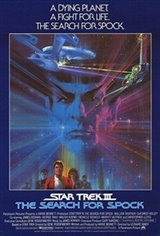Star Trek
After spending the first half of the 1950s writing speeches for Los Angeles' chief of police, Roddenberry quit the force because he was eager to write for the new medium of television. He spent the 1950s and early 1960s as a television writer. While Roddenberry enjoyed writing, he knew his idea for a "Western in Space" was going to be big.
His vision of the future stood in stark opposition to the negativity of the Cold War. Americans were afraid of World War III, and that the technological wonders of the space race with the Soviets would lead to the extinction of mankind.
Gene Roddenberry didn't think that way. He tapped into the timeless spirit of American optimism to depict a peaceful vision of the future. In the 23rd century, there would no racism. The crew of the USS Enterprise was a mix of Scottish, Asian, African, American, Russian and (fictional) Vulcan heritage. The crew had disagreements but they respected one another. The crew also had a great sense of camaraderie, which applied to both the cast and their fictional counterparts.
Getting Star Trek off the ground was not as easy as saying "engage." The first pilot showed promise, but it failed to convince CBS that this was the winning formula for Star Trek. Mr. Spock was an appealing character, but that was about all. The rest of the show just didn't feel quite right. The cast didn't jell, and the sense of adventure wasn't there. When Captain Pike was replaced with Captain Kirk in the second pilot, William Shatner's presence and charisma steered the show back onto its charted course.
Star Trek made its TV debut on September 8, 1966 and would inspire a generation to want to explore outer space. Surely if man was just three years away from walking on the moon, then in two hundred years man was sure to be exploring the rest of the galaxy.
Imagine seeing a multi-ethnic show on TV in 1966. America was in the midst of a civil rights battle that was becoming increasingly violent. The Vietnam War was pressing on and young people were beginning to fight back against their government. The lines were drawn. And yet on television the world was at peace. Humanity had found a way to set aside their differences and explore the galaxy in peace.
If the casting choice wasn't an obvious enough allegory, Roddenberry had another trick up his sleeve. Because Star Trek took place in the future, the crew of the Enterprise could visit more "primitive" worlds and speak to them about how Earth was once like them. In one episode Captain Kirk says, "War is instinctive. But the instinct can be fought. We're human beings with the blood of a million savage years on our hands! But we can stop it. We can admit that we're killers... but we're not going to kill today. That's all it takes! Knowing that we're not going to kill - today!"
It's subtle enough to not sound dated, but if you were an American hearing that in the '60s, you knew exactly what Kirk was talking about.
At the height of the Civil Rights Movement, when a nation was divided, it was Star Trek that made history with the first televised interracial kiss between Captain Kirk and Lieutenant Uhura.
Although some of the dialogue in Star Trek is tinged with residual sexism from the era, female Starfleet officers were always treated with respect. There is no limit to how far female officers could advance, and there have been several female captains and admirals in Star Trek's 50-year history.
Star Trek inspired a generation of young people to take up science. Fifty years later, we had the flip phone because of Star Trek's communicators. Motorola engineer Martin Cooper, inspired by watching Captain Kirk using his communicator, developed the first handheld mobile phone in 1973. Later, in 1996, when Motorola released the first ever flip phone, it was aptly named the StarTAC.
It's been quite the ride, but we're just getting started. Live long and prosper. ~Yanis Khamsi

